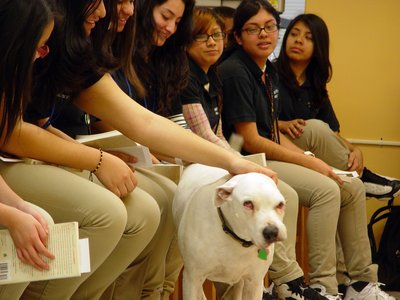A room full of eighth graders sat quietly on the morning of March 15 with copies of “Oogy: The Dog Only a Family Could Love” in their laps as an 80-pound Dogo Argentina rescue with half a face visited them, one by one.
Oogy is one lucky dog. He was found nine years ago by Pennsylvania police with half of his head bitten off. Because Oogy – who was initially mistaken for a pit bull – would not fight, he had been used as “bait” to teach pit bulls to fight. He had been left bleeding and starving in a cage for a week before he was found, and was brought to Ardmore Animal Hospital where veterinarians fixed his face for free.
If he had been taken to the ASPCA first, which is the usual protocol with found animals, he would have been immediately euthanized, Oogy’s owner and Pennsylvania-based author Larry Levin explained to the students.
Coincidentally, Levin, who had gone to the same hospital with his adopted twin sons to put down their 14-year-old old cat Buzzy, met Oogy in passing on their way out. When the wounded pup covered the family with kisses, it was a no-brainer that he would join them, he said.
“It was love at first sight all around,” he recalled.
Years after adopting Oogy, their generous gesture won them a spot on “Oprah,” which then got Levin a book deal, and Oogy’s tale quickly became a New York Times bestseller.
Oogy comes to West New York
Levin and Oogy, based on the popularity of the book and the way it easily applied to many different life lessons, began touring. They went to schools, held fundraisers for animal rights causes and shelters, and spread Oogy’s inspirational message of survival and hope despite how tremendous the odds against one may be.
West New York Middle School art teacher Sarah Chrystal volunteers regularly at a shelter in South Orange and met Levin at a fundraising event in Hoboken in October. When she heard Oogy’s story, she was convinced Levin and the dog’s message aligned well with her students’ lives.
After “pestering” Levin, he agreed to visit the middle school, and the West New York Board of Education agreed to purchase 60 copies of his book for the students of three eighth grade reading classes. Levin told their story as Oogy alternately napped, snacked, and nuzzled the students and faculty, to everyone’s delight.
“Oogy taught me a really important lesson,” Levin told the students. “People go through bad stuff. It’s inevitable. But you can get through it. [Oogy] survived the worst imaginable ordeal, and he’s fine.”
“This is the story of Oogy and how he didn’t give up,” Assistant Superintendant of Schools Stacey Olivero told the students. “The most important message is that you can all make a difference, no matter how hard it may seem. It’s a message I hope you will keep in your heart for a very long time.”
“People go through bad stuff. It’s inevitable. But you can get through it.” – Larry Levin
____________
Oogy, Oprah, and the bestseller
One day in 2007, a gentleman who ran a local rescue organization that focused on adopting out rehabilitated fighting dogs asked Levin to write a small article about Oogy for his website.
“I always fancied myself a writer, so I said sure,” Levin said.
The article “got around” on the internet, so much so that in February of 2008, while Levin was cooking dinner for his boys, the phone rang. The woman on the line said they wanted to do a segment on Oogy the following week in Chicago.
Levin protested, as he and his wife were busy with work and raising twins. “There’s no way we can get to Chicago next week,” he said. “What’s the name of the show?”
When the woman said it was the Oprah Winfrey Show, his next question became, “When should we be there?”
Levin drove Oogy the 15 hours to the studio because of the dog’s fear of crates that developed when he was left to die in one. The show was a hit.
Ten days later, a literary agent called Levin and asked him to write a book. Grand Central Publishing bought the rights to the story idea, and two years later, in October 2010, the book became a New York Times bestseller.
Oogy teaches acceptance
“You have to realize that half of Oogy’s head was gone,” Levin told the students. “He had a hole in his head the size of a softball.” The dog’s cheekbone had been crushed, part of his jaw was broken off, and he had lain without food, water, or medical attention for around a week.
Upon meeting Oogy, Levin joked and said, “Boy, that’s one ugly dog.” In fact, his name is a variation on “ugly.” But, he added, appearance and heritage are no basis for discrimination.
“It’s no more acceptable to dislike or be afraid of a dog because of its breed as it is to dislike or be afraid of a person because of his or her ethnicity, or skin color, or even sexual preference,” Levin said. “Every dog is an individual, and every person is an individual, and they all deserve respect.”
Gennarose Pope may be reached at gpope@hudsonreporter.com.
